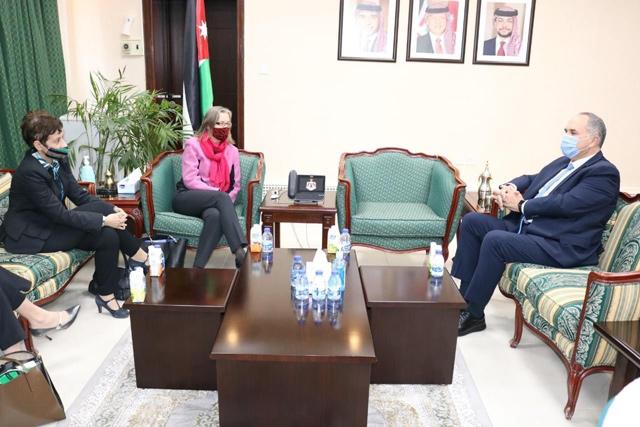You are here
Justice minister, EU ambassador discuss strengthening cooperation on rule of law
By JT - Feb 23,2021 - Last updated at Feb 23,2021

Minister of Justice Bassam Talhouni meets with Ambassador of the European Union Maria Hadjitheodosiou on Monday (Photo courtesy of Justice Ministry Facebook page)
AMMAN — Minister of Justice Bassam Talhouni and Ambassador of the European Union (EU) Maria Hadjitheodosiou, on Monday met to discuss the ongoing cooperation in the Justice sector in the framework of the 50-million-euro “Support to the Rule of Law in Jordan” programme.
The EU continues to support the government’s efforts to promote the rule of law, which is fundamental in promoting a democratic society, and has recently released a second tranche of 9 million euros in the framework of this ongoing support, according to an EU statement.
The minister praised the European Union's continued support for the government's efforts to enhance the rule of law, which is fundamental to promote a democratic society, pointing out that the EU has provided the necessary support for the implementation of the Rule of Law Programme through budget support for the years 2018-2021.
He stressed that the Ministry of Justice and the partners have worked diligently to implement the projects and achieve the indicators of the grant related to supporting the Judicial Council and the independence of the judiciary, and increasing specialised training for judges, the statement said.
They included linking projects electronically between the Ministry and the Public Security Directorate, linking all security centres with the public prosecution departments in the Kingdom, in addition to the remote trial project.
They also included improving the rate of execution of judicial orders, strengthening the system of community penalties and legal aid, and implementing the investment plan of the Ministry of Justice by constructing the Amman Criminal Court and Jerash Justice Palace buildings. The requirements of the first and second tranches have already been met, noted the minister.
Hadjitheodosiou noted the progress achieved and underlined the importance of maintaining the positive momentum in reforms, to fulfil fundamental obligations of the state to its citizens.
During the meeting, the EU ambassador focused in particular on the importance of reinforcing the current free legal aid system and making key legislative reforms to expand the access of citizens to free legal representation in courts, the statement said.
The ambassador also raised the need to ensure legal safeguards, including the right to a lawyer, at every stage of a criminal trial and the development of alternatives to detention for minor crimes.
Through the EU support programme, there has been a significant increase in the number of free legal aid services provided by the Ministry of Justice, and a positive increase in the number of the implementation of judicial orders.
Under this programme, the EU and Jordan set up a pilot programme for the rehabilitation of drug addicts, and developed community-based alternatives to detention. The programme further contributed to the enhancement of the IT services and physical infrastructures of the courts, read the statement.
Among the many achievements supported by this grant were: Developing the independence of the judiciary, with a better financial and administrative structure for the Judicial Council; contributing to the digitalisation of the sector, by providing 88.5 per cent of judges and prosecutors with access to electronic records and with a direct connection to law enforcement departments; and increasing the execution of judicial orders to 65.74 per cent.
It also included establishing a unit in charge of communicating with citizens, which answered more than 2 million incoming calls and 85,000 e-mails in its first operating year; building a treatment centre for inmates addicted to drugs in Bereen, where around 65 per cent of the inmates received trainings and treatment sessions; the appointment of 80 community sanctions liaison officers and the development of operational procedures on community sanctions, including guidelines, work mechanism, monitoring plan and awareness raising activities.
The establishment of a national fund to provide free legal aid services was also a key accomplishment – its sustainable financial allocation and the number of persons who benefitted from it increased from over 200 in 2018 to 993 in 2019.
Related Articles
AMMAN — A ceremony was held on Monday in Jwaideh, Amman, to lay the cornerstone for the new Amman Criminal Court building, which will be bui
AMMAN — On Sunday, Planning Minister Mary Kawar and EU Commissioner for Neighbourhood and Enlargement Negotiations Johannes Hahn awarded a g
AMMAN — Legal aid’s must be improved in its efficiency and effectiveness in order to achieve the Sustainable Development Goals (SDGs),















